The Checker Maven
The World's Most Widely Read Checkers and Draughts Publication
Bob Newell, Editor-in-Chief
Published every Saturday morning in Honolulu, Hawai`i
Noticing missing images? An explanation is here.
Key Landings

With the kind approval of grandmaster Richard Pask, The Checker Maven is pleased to present an electronic reissue of Mr. Pask's classic, Key Landings. Dealing with 25 especially important mid-game landings, this book is suitable for the intermediate to advanced player.
The content of the reissue is unchanged from the original 1990 publication, although the electronic edition has been completely reset with large, clear diagrams and other typographic improvements. The book is available for free download; follow the Richard Pask link in the right-hand column or just click here.
Our thanks go to Richard Pask for permission to republish this important work. Additionally, during the course of 2006, watch here for new editions of Mr. Pask's Key Themes and Key Endings.![]()
One Year Old!
With this issue, The Checker Maven completes its first full year of publication. We're one year old today!

During our first year, we like to think we've done pretty well. Here's some of what we've been able to accomplish.
- We've gone from a handful of readers to an average weekly circulation of over 2,500, thanks to you, our loyal and valued patrons.
- We've published original problems including some of Brian Hinkle's best.
- We've published new Switcher analysis by none other than Richard Fortman.
- We've presented new electronic books by grandmaster Richard Pask.
- For better or worse, we've introduced Marvin J. Mavin and an alternate reality in which checkers is America's number one professional sport.
- We've run well over a hundred articles and maintained a reliable publication schedule.
- We've pioneered speed problems with a challenging (and unforgiving) Javascript timer.
- We've achieved a rather decent Google 'page rank' which is something completely unbiased and not subject to spin and hype.
- ... and we've done all this and much more, in a completely free, non-commercial format.
What lies ahead for The Checker Maven? Predictions are always a bit iffy, so we'll simply say that we hope to be able to continue to publish and please for a long time to come.
Mr. Bill Edwards: Grandmaster from Wales
The Checker Maven is pleased to present the following article about the late Welsh Grandmaster Bill Edwards. The article was written by Mr. Edwards' son, Lindus, himself a Grandmaster.
William (Bill) Edwards was born on the 28th January 1915 in the small coal-mining village of Penrhiwceiber, South Wales. At the age of twelve his father, John, taught him the rudiments of checkers, paying the youngster a penny for each elementary problem he could solve. Within a few months young Edwards accumulated a harvest of pennies and with it an interest to improve in playing strength.
At the age of fifteen his father introduced him to a local club wherein he met a dozen or so players of expert level, one of whom was the gifted crossboard player William Morgan who took the precocious youngster under his wing for several years. Morgan’s fine tuition evidently reaped a great reward when Bill, at the age of just nineteen, won the Glamorgan Open Championship without the loss of a single game in a tournament which attracted the top Welsh players of the day.
Only a few weeks after this impressive performance a serious coal-mining accident crushed Bill’s left foot causing him to be hospitalised for several months and removed him from the checker-playing scene for the next three years until he decided to enter his first Welsh Open Championship. With only a month to prepare he managed to win this prestigious event ahead of such notables as Graham Davies (later to become the British Open Champion), Alf Huggins (also later to become the British Open Champion and World Correspondence Champion), Ivor Edwards (unrelated) and Ernie Rees to name but four among many players of grandmaster strength.
Following several additional major victories Bill joined the Royal Engineers and distinguished himself by being invalided out of the army after a six-year tour of duty in World War Two.

Mr. Bill Edwards, circa 1950
With hardly any preparation Bill entered the English Open Championship in 1948 where he met and befriended the legendary Derek Oldbury. It was only in the final that Bill succumbed to the phenomenally strong crossboard player Percy Crabbe. But not without incident. This was a final now made famous by the incompetence of the time-keeper who announced that Bill needed to make eighteen moves in the two remaining minutes when, in fact, only two moves were required! Attempting to play the required number of moves in so short a time proved fatal with Crabbe capitalising upon an understandable blunder.
Following three more Welsh Championships victories between 1953 and 1955 Bill decided upon permanent retirement from the game and married shortly after.
During the winter of 1971 I discovered some old documents in the attic which revealed the illustrious checker-playing career of my father which, hitherto, he had only briefly talked about. Intrigued by his past I asked whether his interest might be rekindled to the extent of playing in another tournament, at which point he seemed dubious. Within a day or so I bought a checker board and pieces as I was desirous of seeing how skilful he was! To my astonishment I was shown an entirely different game to the one I knew as a small child and wanted, quite naturally, to learn more. Having a checker board and pieces before him for the first time in sixteen years must have served as the catalyst in his comeback, for it was only a few days later that my father and I visited Cardiff YMCA – the scene of many Welsh Championships - in pursuit of meeting the players whose skills had graced that wonderful Victorian building.
After an hour’s wait two gentlemen in their late eighties walked into the room. My father strode up to them and extended his hand as if the many years which separated their last meeting meant nothing. “Bill Edwards!” exclaimed the older of the two. “And you are my old friends Steve James and Stan Bassett,” replied my father. I looked on stupefied and said, “Now I see why checker players have to have such great memories!”
Within a couple of months of that memorable meeting my father began to study such books as ‘World Championship Checkers’ and as many others containing the games of his idol, Dr Marion Tinsley, as possible.
In May of that year my father decided to enter the British Open Championship in North Wales. By a remarkable coincidence, Graham Davies of South Wales was also making a comeback to the game after an almost equally long period.
After eleven gruelling sessions and twenty-two games Graham Davies emerged the winner of that contest with 15 wins and no losses – just ahead of my father who scored 12 wins and no losses.
A year later, and now armed with a knowledge of three-move play which, hitherto he had never studied, Bill won the Scottish Open Championship ahead of John McGill, Tom Watson, James Marshall and Jimmy Grant.
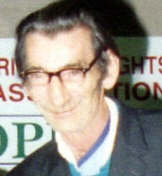
Winner of the 1987 Irish Open
Bill’s golden years were between 1979 and 1987 during which time he won five consecutive English Open Championships, together with several major freestyle tournaments.
When Bill played in the United States-United Kingdom International Match of 1989 he won seven wins out of the eleven managed by the entire UK & Ireland team. When one considers that only five wins were scored in the one hundred and eighty games played by the other nine team members, it makes one realise how strong a player my late father was. In that contest Bill scored two draws with Asa Long and beat the likes of Paul Davies, but it was at a time when he was almost at the peak of his ability.
In 1994 Bill journeyed to Scotland and won the Centenary Scottish Open Championship. Winning this event persuaded him to continue playing in spite of declining health and in 1995, at the age of eighty, he won the British Open Championship without the loss of a single game ahead of Pat McCarthy, Tom Watson and several other notable grandmasters.
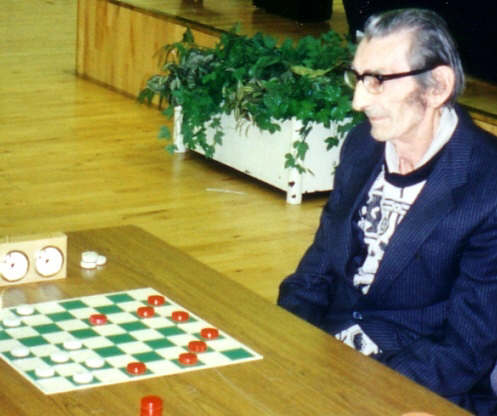
At the 1997 English Open
Following this astonishing success he decided to issue a challenge for three-move championship of the world. At the age of eighty-one and in rapidly deteriorating health Bill journeyed unaccompanied to Ireland in an ill-advised attempt to wrest the title from Ron King of Barbados. Being provided with an inadequately heated room in a sub-standard hotel, whilst Ron King enjoyed the sumptuous comfort of a five-star hotel across the road, did nothing to enhance his chances of winning the match, to say the least of the appalling toll on his health. Seeing his deterioration in health the kindly manager of the hotel at which Ron King was cordially treated in the lap of luxury took pity upon the octogenarian and insisted he stay at his hotel free of charge.
With thoughts of returning home as quickly as possible Bill Edwards, the man who had won almost thirty major championships, not surprisingly played the poorest checkers of his life.
With literally only weeks to live, in chronically poor health and suffering great pain, Bill attempted to win the Droitwich Open, which is a twelve-round freestyle event over a weekend, and was forced to withdraw after only a few sessions, but not before winning his last game with a magnificent touch so typical of his wonderful crossboard ability.
As a player my father was blessed with a phenomenal memory, often memorising dozens of games daily and retaining them for use in tournaments years later! It was not by memory alone however that he was able to defeat the finest players of Great Britain and Ireland over almost thirty years. His crossboard skills were of the highest order, often visualising twenty-five moves in the most complicated positions. I tested this ability on countless occasions, often presenting him with the most convoluted positions imaginable. The outcome was always the same.
After a couple of minutes he would say, “Yes, I can see it now. The piece on square twenty-seven will be lost in twenty-four moves!”
As a person he was liked instantly by all who met him. He exuded a calm at the checker board such as I have never seen and was a quality which undoubtedly assisted him to win a unique number of major tournaments.
Moving a piece on a checker board was something he did with an elegant style and was sheer poetry in motion to behold. Always modest in success and congratulatory to the few who beat him Bill will be remembered not only as the greatest Welsh player to date, but as a person with a big heart who loved everyone.
William “Bill” Edwards died peacefully at Prince Charles Hospital, Merthyr Tydfil, South Wales, during the early hours of Thursday the 23rd July 1998 aged eighty-four years.
Only hours before his passing he asked me how the British Open Championship was progressing–- an indisputable testimony to his deep love of checkers. Pat McCarthy was to later write to me saying, “Your father’s play had a touch of genius about it.” Coming from a player my father regarded as a phenomenal crossboard player this was a fine eulogy indeed.
---Lindus John Edwards.

Penrhiwceiber, Village of Mr. Edwards' Birth
Here is a game played by Mr. Edwards in the 1982 British Championships in which he defeats the legendary Derek Oldbury. Annotations are by Lindus Edwards.
1982 British Championship Match
Edwards: Black
Oldbury: White
| 10-15 | 24-20 |
| 7-10 | 28-24 |
| 3-7 | 23-19 |
| 9-14 | 22-17 |
| 5-9 | 17-13 |
| 15-18 | 26-23 |
| 1-5 | 31-26 |
| 11-16 | 20-11 |
| 8-15 | 26-22 |
| 4-8 | 21-17---A |
| 14-21 | 23-14 |
| 10-26 | 19-3---B |
| 9-14 | 30-23 |
| 21-30 | 32-28 |
| 8-11 | 23-19?---C |
| 11-16 | 19-15 |
| 16-20 | 15-11 |
| 14-18 | 3-8 |
| 6-9 | 13-6 |
| 2-9 | 11-7 |
| 30-26 | 8-11 |
| 26-23 | 7-2 |
| 23-32 | 11-15 |
| 20-27 | 15-22---D |
| 27-31 | 2-6 |
| 9-13 | 29-25 |
| 32-27 | 6-10 |
| 27-23 | 25-21 |
| 12-16 | 10-14 |
| 16-19 | 14-10 |
| 23-27 | 10-7 |
| 19-23---E | Black Wins |
A---Or 22-17 as played by Newell Banks vs. Marion Tinsley as follows: 8-11, 25-22, 18-25, 29-22, 11-16, 22-18, 15-22, 19-15, 10-28, then either 17-1 (Tinsley-Banks) or 17-3 (Tinsley-Hellman).
B---19-1 is the better way.
C---This permits 11-16 and places the piece on 27 in jeopardy. Instead, 24-20 11-15, 27-24, 30-26, 23-19, 6-10, 29-25 Drawn. D. E. Oldbury vs. E. Frazier, 1965 match.
D---"There are other man-down ideas that might have been tried, but to no avail" (DEO).
E---A nicely played win.![]()
Happy Thanksgiving to our American Readers

The Checker Maven wishes a happy Thanksgiving holiday to all our American readers; and if you are taking to the road or the skies, please make your trip a safe one.
We'd like to also take this opportunity to mention again that, during the hectic holiday season, from late November through early January, we generally publish one article per week instead of two.![]()
The Electronic Works of Richard Pask
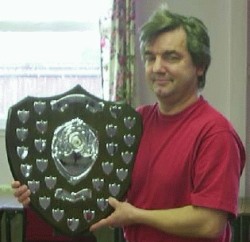
We've gathered together the free electronic publications of Grandmaster Richard Pask on a special page link shown in the Downloads section in the right-hand column (or just click here). All items (currently eight in number) are in PDF format for easy access without special fonts, and have been slightly edited to print correctly on both US letter and European A4 paper sizes. A small number of minor emendations have also been made to Mr. Pask's latest book, The Golden Dozen. Please enjoy these fine works, yours without charge due to the generosity of Mr. Pask.![]()
A Turning Point?
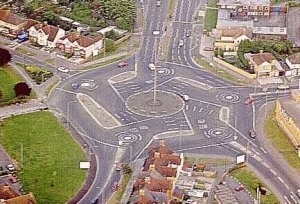
Found on the web, in an otherwise serious and rather well done review of the Chessmaster for Xbox product:
"There comes a time in a person’s life where they feel the urge to make the leap from checkers to chess. This is considered a turning point in an individual’s mental development - the move from king me’s (sic) to En Passant’s (sic) is huge and requires excellent coaching and practice, practice, practice."
The Checker Maven isn't about to launch into one of those hackneyed checkers-vs.-chess debates; we play both games, and find depth and challenge enough for a lifetime in either one.
But, a turning point in one's mental development?
We'd wager a month's beer that the reviewer has never experienced checkers at anything much beyond the toybox level. In fact, we've personally invited him to drop by The Checker Maven website and try out a few of our simpler problems.
That just might turn out to be, in fact, a turning point in one individual's mental development.![]()
Richard Pask's 'The Golden Dozen'

The Checker Maven is privileged to offer for free download Grandmaster Richard Pask's latest work, The Golden Dozen, a comprehensive examination of the newest additions to the three-move deck. You can download this 55 page book in PDF format via the link in the Downloads section in the right-hand column, or simply by clicking here. Our thanks to Mr. Pask for allowing us to host this work on our website.![]()
Make Your Own 3-Move Card Decks!

"One file is the back of the card, another is the first 10 cards, and the third is the last of the 5 cards (twice to not waste labels.) So if you print the first two files twice and the last file once, you will have 2 full decks. I added the 14th move card on barred openings as a bonus (and again just to not waste a card.) They are designed to work with Avery 5371 labels. I printed out a set and laminated them and they seem fine."
You can get everything you need by clicking on the 3-Move Deck entry in the Download section in the right-hand column, or just click right here.
Our thanks to Bob for sending this our way.![]()
Revised Electronic Edition of 'Checkers Made Easy'

100 Years of International Matches
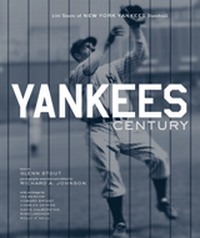
That first match was easily won by the U.K. team. But the tide turned thereafter in a westerly direction, as all subsequent matches have been won by the U.S. The score of last week's 100th anniversary match was 71-18 in favor of the Yanks, with 111 draws. The full story can be read on the American Checker Federation web site; there you can also make donations toward the costs of the event, and find out about the forthcoming match book.
American grandmaster and World Champion Alex Moiseyev was unable to play, as were British grandmasters Lindus Edwards and Richard Pask. One can only speculate as to how the results might have differed had these very strong players been in the mix.
Women's World Champion Patricia Breen was on the British squad, as was former Women's World Champion Joan Caws. Ms. Breen soon defends her title against New Zealand's Jan Mortimer in a match that promises to be hard fought, close, and exciting.
The Checker Maven congratulates all concerned: players, officials, organizers, hosts, and visitors. A long, sportsmanlike, and genteel checker rivalry, which brings the highest honor to our game, has added another fine chapter to its history.![]()
The Checker Maven is produced at editorial offices in Honolulu, Hawai`i, as a completely non-commercial public service from which no profit is obtained or sought. Original material is Copyright © 2004-2025 Avi Gobbler Publishing. Other material is public domain, as attributed, or licensed under Creative Commons. Information presented on this site is offered as-is, at no cost, and bears no express or implied warranty as to accuracy or usability. You agree that you use such information entirely at your own risk. No liabilities of any kind under any legal theory whatsoever are accepted. The Checker Maven is dedicated to the memory of Mr. Bob Newell, Sr.

